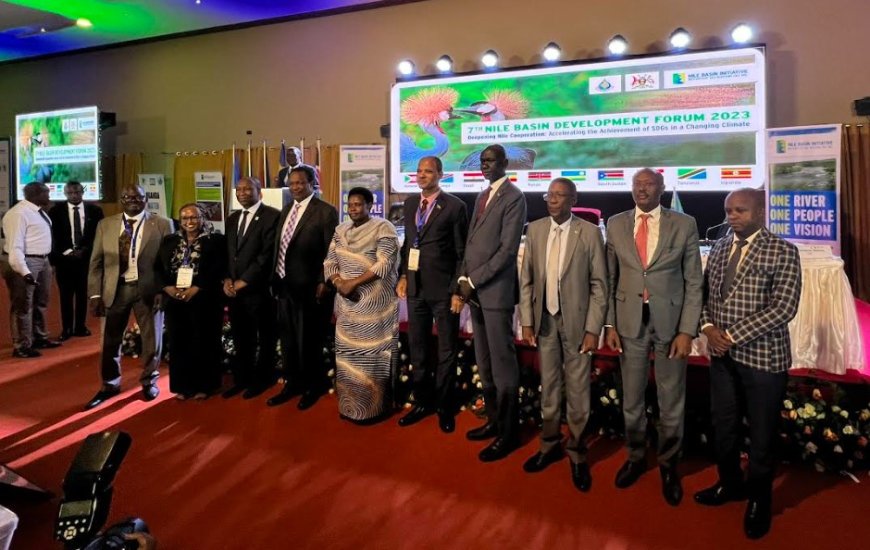The Crucial Connection between Transboundary Water Resource Cooperation and the Attainment of the SDGs
The Forum's central theme, "Deepening Nile Cooperation: Accelerating the Achievement of SDGs in a Changing Climate" underscores the importance of collaborative efforts in the face of evolving environmental challenges.

KAMPALA - The 7th Nile basin Development Forum is being held at Speke Resort Munyonyo, Kampala, Uganda. It started on 16th October, 2023, and will end on 17th October 2023. The Forum's central theme, "Deepening Nile Cooperation: Accelerating the Achievement of SDGs in a Changing Climate" underscores the importance of collaborative efforts in the face of evolving environmental challenges.
Renowned Scholar Prof. P. L. O. Lumumba delivered the keynote speech, focusing on the critical topic of deepening transboundary cooperation to expedite the realization of Sustainable Development Goals. This gathering serves as a platform for dialogue and strategizing among nations that share the Nile Basin, emphasizing the urgency of united action in pursuit of sustainable development objectives.
Ambassadors from Burundi, DRC, Egypt, Ethiopia, Rwanda, S.sudan, Sudan, Tanzania, development partners, former EDs of the Nile Basin Initiative are all taking part.
According to Prof. Lumumba, water, being a precious and finite resource, transcends political boundaries, impacting communities, regions, and nations. The collaborative management of shared water resources holds the key to achieving Sustainable Development Goals (SDGs), spanning from poverty eradication to climate action.
According to Prof. P.L.O. Lumumba LL. D, D.Litt. (hc), D.Sc. (hc), FCPS (K), FKIM, FAAS (hon), on the occasion of the 7th Nile Basin Development Forum held at Speke Resort Munyonyo, Kampala, Uganda, on Monday 16th October 2023, being a Pan-Africanist himself, he quoted Kwame Nkrumah who said: “It is clear that we must find an African solution to our problems, and that this can only be found in African unity. Divided we are weak; united, Africa could become one of the greatest forces for good in the world.” The Forum's Theme: Deepening Nile Cooperation: Accelerating the Achievement of SDGs in aChanging Climate. Below are some of the points highlighted by Prof. Lumumba.
1. Water as a Catalyst for Economic Development:
Shared water resources facilitate economic development, reducing poverty and hunger (SDGs 1 and 2).
Collaboration in managing rivers, lakes, and aquifers sustains agriculture and industry, directly addressing the fundamental needs of communities.
2. Role in Combating Climate Change:
Sustainable water management aids in the fight against climate change (SDGs 13, 14, and 15). Transboundary cooperation enables nations to develop resilient infrastructure, manage floods, and ensure sustainable water use, making SDGs related to climate action more achievable.
3. Promoting Peace and Security:
Collaboration prevents conflicts arising from disputes over shared water resources. Fostering joint governance and trust contributes to peace and regional stability (SDG 16).
4. Inclusive and Equitable Participation:
Inclusive water management respecting the rights of all stakeholders aligns with principles of equality and social justice (SDGs 5 and 10). Consideration for marginalized communities, women, and indigenous people is essential.
Conclusion: In conclusion, transboundary water cooperation is not just a recommendation but a moral imperative and strategic necessity. The fate of our world, communities, and future generations depends on wise stewardship of shared water resources. Water, the essence of life and interconnected with every SDG, is the unifying thread that weaves through each goal, aspiration, and dream.
Summary of Key Points:
Interconnectivity of SDGs: Water is the unifying thread running through each SDG, encompassing life, health, sustenance, economic growth, and environmental preservation.
Collective Action: Achieving SDGs requires collective actions and wise stewardship of shared water resources.
Catalyst for Progress: Transboundary water cooperation is about sowing the seeds of peace, cooperation, and sustainable development.
Partnerships and Knowledge Sharing: Through partnerships, knowledge sharing, and collaboration, the potential of shared water resources can drive progress and prosperity for all.
Conflict as an Opportunity: Conflict may arise, but it can be an opportunity to rise above divisions and forge a path forward.
Call to Action: As custodians of our shared future, embracing the call of history, rising above conflicts, and fostering cooperation are essential. Transboundary water cooperation safeguards life, the health of the planet, and the prosperity of future generations. Together, through the power of cooperation, the attainment of the SDGs is not a distant mirage but a tangible reality within our grasp.
Meanwhile, According to PROFESSOR PLO-LUMUMBA , LL. D, D.Litt. (hc), D.Sc. (hc), FCPS (K), FKIM, FAAS (hon) ,the Connection between Transboundary Water Resource Cooperation and the Attainment of the SDGs.
First and foremost, water is life. It is a precious and finite resource that transcends political boundaries. Many communities, regions, and even nations rely on shared rivers, lakes, and aquifers for their water supply, agriculture, and industry. When nations collaborate to manage these shared resources, they facilitate economic development and alleviate the plight of those in dire need. This cooperation can help reduce poverty and hunger, which are fundamental to the first two SDGs.
Secondly, sustainable water management is pivotal in the fight against climate change. As we combat the adverse impacts of global warming, water is both a victim and a cause of environmental degradation. Transboundary water cooperation enables nations to adapt to climate change through the development of resilient infrastructure, flood management, and sustainable water use. Achieving the SDGs related to climate action, life below water, and life on land becomes more feasible when water resources are managed collectively. Moreover, the benefits of transboundary water cooperation extend to peace and security. History bears witness to countless conflicts arising from disputes over shared water resources.
By fostering collaboration and joint governance, nations can build trust, promote regional stability, and prevent potential conflicts. This is especially pertinent to the SDG 16 on peace, justice, and strong institutions, as well as the overarching theme of peace and prosperity engrained in the SDGs. It is imperative that we recognize the importance of inclusive and equitable participation in water management. This approach must respect the rights and needs of all stakeholders, including marginalized communities, women, and indigenous people. In doing so, we can align transboundary water cooperation with the principles of equality and social justice underpinning the SDGs. Prof. Lumumba underscored the profound significance of transboundary water cooperation in propelling us toward the realization of the Sustainable Development Goals.
Prof. Lumumba added; as I stand before you today, I am reminded of the vital importance of water - the lifeblood of our existence. It is the substance that knows no borders, that flows freely across our shared planet, and that sustains not only our lives but the very future of our global community. Transboundary water cooperation is not a mere recommendation; it is a moral imperative and a strategic necessity. We find ourselves at a critical juncture, a juncture where the fate of our world, our communities, and our future generations hangs in the balance. It is a juncture where the realization of the SDGs, with their profound promise of eradicating poverty, reducing inequality, and preserving our planet, depends on our collective actions and the wise stewardship of our shared water resources. As we reflect upon the profound interconnectivity of the SDGs, we must acknowledge that water is the unifying thread that weaves through each goal, each aspiration, and each dream. The essence of life, of health, of sustenance, of economic growth, and of environmental preservation is entwined in the flow of transboundary waters. And in this realization, we must embrace the fundamental truth that no nation, no community, and no individual can achieve these goals in isolation.
Lastly, Prof. Lumumba said we must recognize that transboundary water cooperation is not merely about quenching our immediate thirst or ensuring the vitality of our crops; it is about sowing the seeds of peace, cooperation, and sustainable development. It is about forging bonds of mutual understanding, shared responsibility, and harmonious coexistence among nations.

































































































